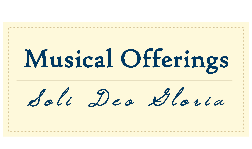Publication Date
3-28-2017
Document Type
Article
Keywords
Music, church, church music, instrumental music, organ, liturgy, sacred worship
Abstract
The Christian church’s stance on the use of instruments in sacred music shifted through influences of church leaders, composers, and secular culture. Synthesizing the writings of early church leaders and church historians reveals a clear progression. The early musical practices of the church were connected to the Jewish synagogues. As recorded in the Old Testament, Jewish worship included instruments as assigned by one’s priestly tribe. Eventually, early church leaders rejected that inclusion and developed a rather robust argument against instruments in liturgical worship. The totalitarian stance on musical instruments in sacred worship began to loosen as the organ increased in use and popularity. Organs began to find a more regular place in churches by the twelfth century. While organ music set a precedent which will later allow for the entry of other instruments into the sanctuary, it took quite a while to do so. As the Protestant Reformation changed the face of the church, Martin Luther served a crucial role, not just as a theological leader, but also as the center of a new musical movement in the church. This Reformation began a series of reactions that eventually leads to the church’s general acceptance of instruments in sacred worship.
Volume
8
Issue
1
Article Number
2
DOI
10.15385/jmo.2017.8.1.2
Recommended Citation
Lyons, Jonathan M.
(2017)
"From Silence to Golden: The Slow Integration of Instruments into Christian Worship,"
Musical Offerings: Vol. 8:
No.
1, Article 2.
DOI: 10.15385/jmo.2017.8.1.2
Available at:
https://digitalcommons.cedarville.edu/musicalofferings/vol8/iss1/2
Creative Commons License

This work is licensed under a Creative Commons Attribution-Noncommercial-No Derivative Works 4.0 License.
Disclaimer
The CedarCommons repository provides a publication platform for fully open access journals, which means that all articles are available on the Internet to all users immediately upon publication. However, the opinions and sentiments expressed by the authors of articles published in our journals do not necessarily indicate the endorsement or reflect the views of Digital Services, the Centennial Library, or Cedarville University and its employees. The authors are solely responsible for the content of their work. Please address questions to the Digital Services staff.
Included in
Christianity Commons, Fine Arts Commons, Liturgy and Worship Commons, Musicology Commons, Music Performance Commons


